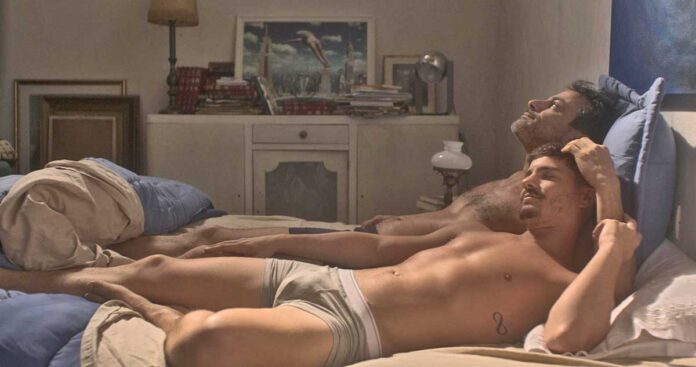“A Skeleton in the Closet,” out January 12 on DVD, is out gay Argentine filmmaker Nicolás Teté’s poignant drama about Manuel (Facundo Gambandé), a gay man who returns home for his parent’s wedding anniversary. Manu has been living in Buenos Aires, where he is studying architecture and dating Maximo (Ramiro Delgado). However, his mood changes when he returns to his hometown of Mercedes. He has not felt comfortable with his parents, Clara (María Fernanda Callejón) and Luis (Diego De Paula), since coming out last Christmas. Moreover, Maximo soon breaks up with him. To cope, Manuel begins seeing Martín (Lucas Ferraro of “Plan B”), his former teacher and tries to find some happiness.
In a recent interview via WhatsApp, Teté insisted that “A Skeleton in the Closet” is not a biographical film. “All people have a difficult time with their parents when they say they are gay, but it’s not my life. I think it would be boring to write about my life. And, I never had a sexy teacher!”
He explained why he made a film, set in his hometown, about Manuel navigating his relationship with his parents, “When I was teenager and I started to think about my sexuality, I felt I didn’t have options. If I am gay, my family will hate me. This town is not for me. When I was a teenager, I didn’t know other gay people, and the only gay people in Mercedes had problems. They were hairdressers, and people thought and talked about their being gay like it was a bad thing.”
Many youths, LGBT or not, who grow up in small towns, feel they have to escape to the city when they finish school. In Buenos Aires, Teté thought he could have a gay life in Buenos Aires because sexuality is less of a problem there. But, he acknowledged, “You go home for holidays, and being gay is a problem again.”
Even in Argentina, where same-sex marriage is legalized, the filmmaker observed that being gay has its difficulties because of Catholicism. And there are many cases of homophobic attacks when gay couples hold hands or kiss in the street.
“A Skeleton in the Closet” pivots on Manuel struggling when he learns a family secret that he thinks should be disclosed. Teté said, “I didn’t want to make a film that the problem was Manuel was gay. We can see that Manuel has other problems, and the family has its problems. But one level, the real problem is that Manuel doesn’t know what to do with his life, and the family problem is that they don’t know how to have a good relationship with Manuel. The secrets make things difficult. When I was in the closet, my relationship with my parents was very hard because I had a secret, and it made me angry because I had to keep that secret.”
Teté took great care to get the actors to live like a family to make the film authentic. “A Skeleton in the Closet” was shot at the filmmaker’s parents’ house in Mercedes. Manuel’s bedroom is Teté’s childhood bedroom. The actors first met two weeks before they started shooting and they lived together to create the familial relationships in the film.
Teté cast the out gay Facundo Gambandé and said not only was it important to have an openly gay actor in the lead, but he was pleased Gambandé was from Córdoba, and not Buenos Aires. He recalled meeting the actor and bonding over similar personal experiences of growing up in a small town. He also found it gratifying that that the actor, who first gained fame appearing on a Disney show, has a fanbase that embraced him appearing in a gay film.
“A Skeleton in the Closet” is chaste enough for young viewers and for parents. While there are some gay kisses and a few bedroom scenes between Manuel and Martín, Teté emphasized that, “It’s not about sex or nudity; it is a story about a gay man. I wanted to make a feel good movie. It’s a good gay film for people who are not gay. It’s about feelings and family, so it’s good to watch with your mother or father. It shows gay life. It’s not a movie for homophobic people.” Then he confessed, “I want to make a hot film next.”
Making films is Teté’s passion, and he claims he is happiest being on set. When not shooting, he enjoys spending time with his boyfriend and their dog in Buenos Aires and visiting his family. He also loves cooking and eating, and incorporated food into his film by having Manuel’s father run an Italian pasta company. Moreover, Manuel finds his bliss in cooking. This prompted Teté to add slyly, “Food is a good ingredient for a comfort movie!,” which may be why Manuel in the film enjoys cooking so much.
